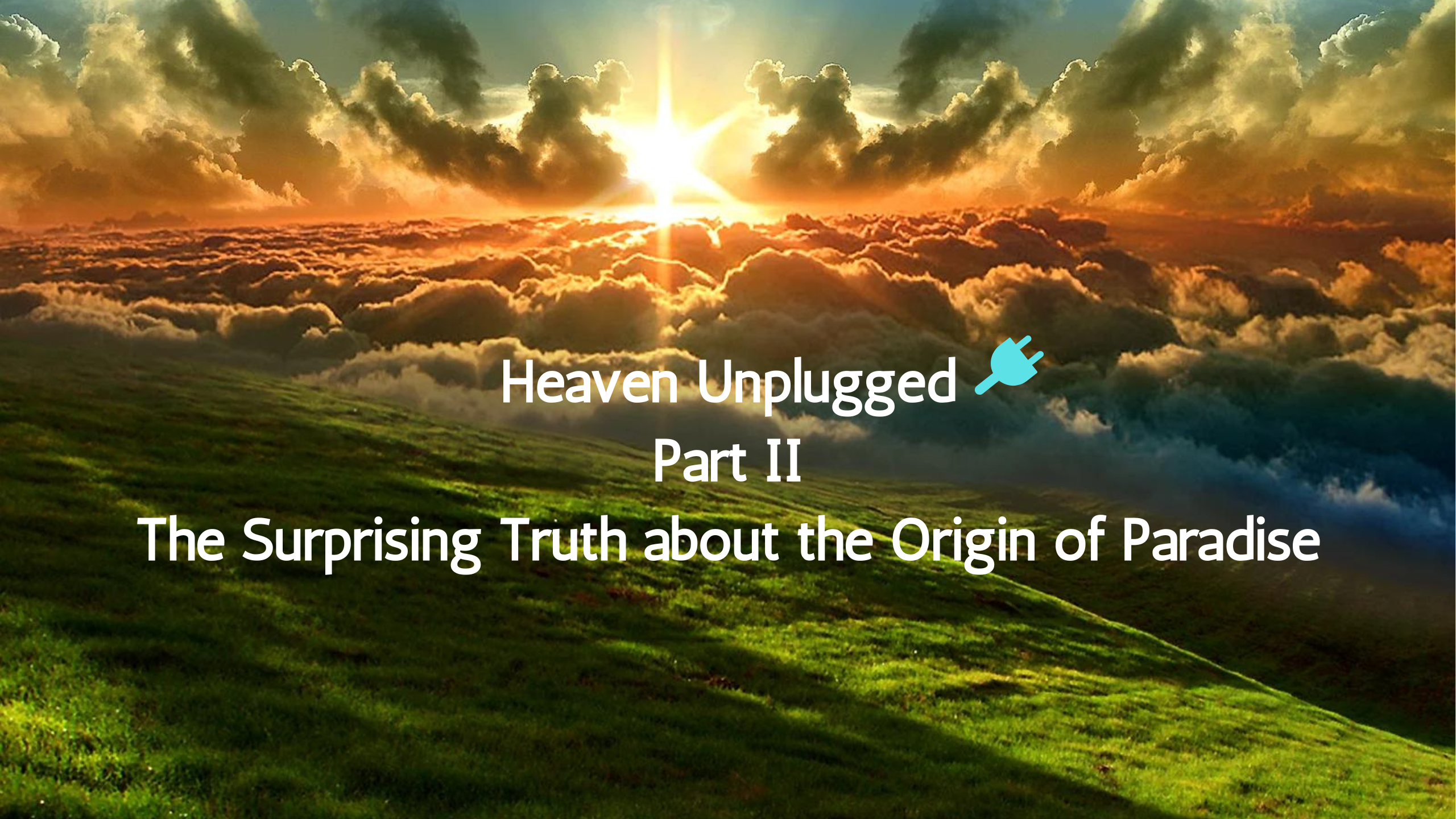What’s the truth about heaven or Paradise? What does the Bible say about whether believers will spend eternity in Paradise? Does Scripture say God is preparing a place in heaven where believers will live forever? Let’s see where the concept of Paradise came from.
First, let’s recap Jewish thought on heaven and the afterlife: Early Jewish Beliefs: In ancient times, the times of Abraham, Isaac, Jacob, Joseph, and those in slavery in Egypt, Jewish beliefs about the afterlife were centered around Sheol, the grave or the realm of the dead, not a place of rewards and punishments.
Then, in the Biblical Period, from Moses to Babylon’s captivity in 586 BC, they still mentioned Sheol as the destination for the dead. Still, they focused more on earthly life and the relationship between God and humanity. To the biblical Jews, Heaven was where God and other celestial beings lived; it wasn’t an afterlife destination for humanity.
After the defeat of Babylon by Persia, the Jews were allowed to return to their land. This is the Second Temple Period (or Intertestamental Period): They were influenced by the Babylonian and Persian cultures, and their thoughts about the afterlife began to evolve. As the Greek authority grew, Hellenism influenced them, which brought new beliefs about the afterlife. Concepts like the resurrection and a more defined rewards and punishment system took hold in Judaism. This period was filled with Writings from new Jewish leadership groups like the Pharisees, Scribes, Sadducees, Essenes, and Rabbis. During this time, the synagogue system was also developed to teach the people what they had forgotten about Torah and Jewish traditions. The Pharisees, Scribes, Sadducees, Essenes, and Rabbis became the interpreters, teachers, and enforcers of the Torah.
The Jewish concepts of hell, an afterlife, the resurrection, and paradise evolved during this Second Temple Period. The Old Testament hadn’t developed doctrines about these ideas for an afterlife. They had “Sheol” (the grave) where both the righteous and wicked went, and there were no rewards or punishment, only silence and darkness.
Resurrection became a good idea, but that idea was only hinted at in the Old Testament. The concept of “Paradise” as a blissful place to spend eternity wasn’t in the Old Testament. So, where did Paradise come from? It came from the writings of the scribes, Essenes, and rabbis of the Second Temple Period.
I don’t want to confuse you here, but to understand where believers will spend eternity and to “Unplug Heaven” from tradition and misconceptions, I need to help you understand the process of interpreting scripture. I take a conservative approach to interpretation of the Bible. I believe in the inerrancy of scripture. What does Scriptural inerrancy mean? Does it mean everything in your Bible is true or without error? That isn’t the definition of inerrancy. Paul defines inerrancy in 2 Timothy 3:16-17.
How were the writers of Scripture “inspired by God?” Did they go into a trance, wake up later, see a scroll before them, and say, “Let me see what God had to say through me?” No, they were inspired by God as God utilized all the experiences, personality, knowledge, and understanding of that person. It wasn’t mechanical writing. The writers of scripture weren’t celestial fax machines. What the “inspired” writers of scripture wrote was a combination of their cultural makeup and God’s truth. How can we know the difference in Scripture? Paul tells us in 2 Timothy 2:15 that correctly teaching the word of truth takes diligence and work. The great mistake of our generation is we want to make everything quick and easy. Quick and easy may be great for popcorn and pop technology, but it’s not for eternal truth. What is the “Word of truth,” and what does it mean to “teach it correctly?”
A statement released by a conference of evangelical scholars and theologians on Biblical Inerrancy states: The Bible, in its original manuscripts, is without error in all that it affirms. What does it mean for the Bible to “affirm” something? To “affirm” something means to teach as truth. Are there things in the Bible that it doesn’t affirm?
As Paul said to Timothy, it’s incumbent on every teacher to correctly interpret the word of truth. It’s important to teach what the word of God affirms as truth. Some mishandle the Bible by teaching every word in scripture as an affirmation, but some things are recorded as a reference and not an affirmation of truth. When studying scripture and preparing for these videos, I follow a method of interpretation that requires me always to remember what I’m reading *wasn’t written to me but can be used for me. I also remember to keep the *text I’m reading in the context of the writer writing it. Separate what *Reference is from what Affirmation is in the text.
Reference in scripture was accepted at the time as true cross-culturally, whereas Affirmation was taught in the text as a revealed truth from God. Examples of reference (mustard seed, inward body parts are where emotions reside (Proverbs 20:27). In the ancient world, the kidneys were associated with the deepest emotions, thoughts, and the innermost being of a person. An example of something that references the beliefs of the culture and a truth affirmed by scripture.
The parable about the Rich Man and Lazarus illustrates cultural references to the afterlife and what the scripture affirms to be true about the afterlife (Luke 16:19-31). From this parable, what is “Reference” and what is “Affirmation?” Angels carrying Lazarus to Abraham was part of the development of angelology during the Second Temple Period from the Book of Enoch. The reversal of fortunes in the afterlife is also from the Book of Enoch. Rewards of comfort and joy and judgment and torment in the afterlife are from the Books of 2nd and 4th Esdras. Repentance as a means of receiving mercy and forgiveness is from the Book of Tobit. Rabbinic teaching during the 2nd Temple period developed Abraham’s Bosom/side as Paradise. Resurrection was spoken of in 2 Maccabees, Enoch, and 2nd and 4th Esdras. All writings are from what is known as the pseudepigrapha.
What is the correct interpretation and affirming truth taught in this passage? We can determine it’s a parable, and it’s not meant to verify the afterlife. Almost everything in this story is based on cross-cultural beliefs at the time. Therefore, those beliefs are being referenced for them and us. Let’s look at the end of the parable in verses 29-31 for what the parable is affirming: If anyone doesn’t listen to and believe God’s word (here Moses and the prophets), then they won’t be convinced by miracles or even the resurrection of the Messiah.
So, what was the truth of affirming the origin of “Paradise?” It was a cross-cultural wish or fantasy and not a truth affirmed by the word of God. In the next episode, we’ll examine whether the New Testament writers ever affirmed that believers would spend eternity in heaven.


